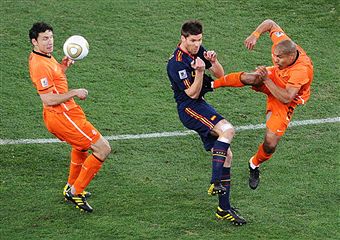Football is a remarkably conservative sport when it comes to changing the rules.
Normally, I’m all in favour of a cautious approach to this fundamental matter; it tends to be a sign of a sport in good health.
The 2010 World Cup, though, has highlighted a couple of areas that require attention.
One, all England fans will be familiar with: it just isn’t good enough for “goals” such as Frank Lampard’s in Bloemfontein to get disallowed at elite level.
Too much is at stake and it makes FIFA a global laughing-stock.
The other was highlighted by Sunday’s ugly World Cup final - has a match ever fallen so far short of admittedly lofty public expectations?
Unless you inhabit one of the more secluded corners of Pyongyang, you’ll be familiar by now with the plot:
1. The underdog Dutch team, once prime European exponents of the beautiful game, appeared determined to stop Spain playing by whatever means necessary.
2. The referee, no doubt aware of the event’s stature as the year’s most-watched sporting fixture and perhaps reluctant to take steps that might ruin the spectacle and all but decide the outcome at an early stage, reacted with great leniency, refraining from brandishing his red card until the 109th minute.
3. Result: a deeply disappointing conclusion to one of the planet’s great sporting festivals.
 Actually, it could have been worse, since the Dutch could easily have won had Arjen Robben accepted either of the clear chances that came his way.
Actually, it could have been worse, since the Dutch could easily have won had Arjen Robben accepted either of the clear chances that came his way.
What I think the occasion demonstrated was the case for football to consider taking a leaf out of ice hockey and rugby union’s respective books by introducing a sin-bin.
It’s obviously conjecture on my part, but I’m guessing that if referee Howard Webb had had the option of banishing one or more of the worst orange-shirted offenders to the dug-out for 10 minutes - even early in the game - he would have taken it.
Such a move would have handed the slick-passing Spaniards a significant advantage, but for a finite period, with the balance of forces being restored once the penalty was served.
I have thought for some time that a sin-bin would be a worthwhile introduction.
After all, under the present system, the severity of the punishment for identical red-card offences depends entirely on whether the foul was committed in the first or the 90th minute.
But I have never known a match make the case for time-limited penalties as clearly as Sunday’s calamity in the Calabash.
I’d be interested to know whether readers of insideworldfootball agree.
David Owen is a specialist sports journalist who worked for 20 years for the Financial Times in the United States, Canada, France and the UK. He ended his FT career as sports editor after the 2006 World Cup and is now freelancing, including covering the 2008 Beijing Olympics and 2010 World Cup. Owen’s Twitter feed can be accessed at www.twitter.com/dodo938

.jpg)